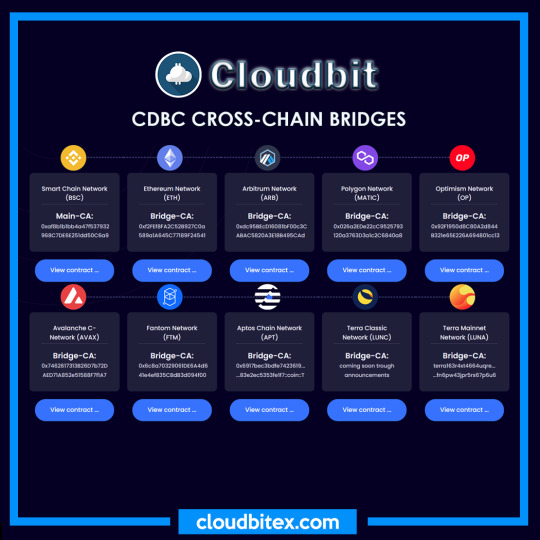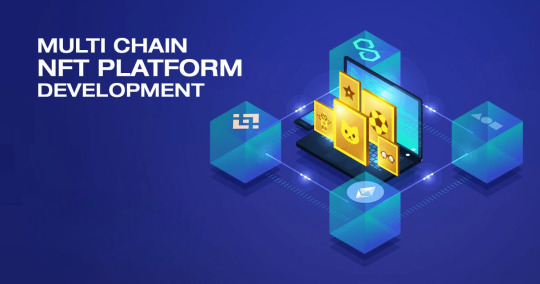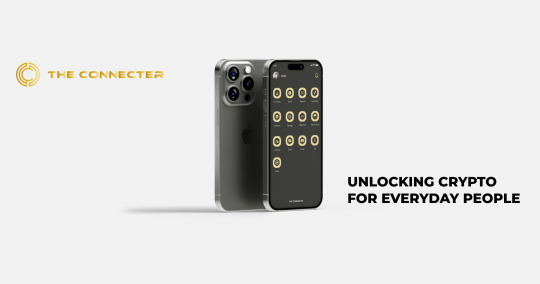#multichain
Explore tagged Tumblr posts
Text
📣 Breaking News! We are happy to announce, that we get listed on CoinInn!
🔗https://coininn.com/announcement/668e70c3f29301249011d869
📜 CA: 0xaf8b1b1bb4a47f537932968C7DE6E251dd50C6a9
🔝 Turn on post notifications

6 notes
·
View notes
Text
Multichain-Hack: Mittlerweile schon mehr als 240 Millionen Dollar gestohlen
Multichain-Hack: Mittlerweile schon mehr als 240 Millionen Dollar gestohlen
Die Crosschain-Brücke Multichain wurde erneut gehackt. Nach allem, was bekannt ist, wurden zunächst Assets im Wert von 130 Millionen Dollar entwendet, gefolgt von weiteren 120 Millionen Dollar. Die Ursache ist derzeit nicht bekannt. Continue reading Untitled

View On WordPress
2 notes
·
View notes
Text
Cross Chain Bridge Development Company - Touch Crypto

Touch Crypto is a premier Cross Chain Bridge Development Company specializing in creating robust, secure, and scalable solutions that connect different blockchain networks. Our experienced team helps businesses enable seamless asset transfers, data exchange, and smart contract interactions across multiple chains such as Ethereum, Binance Smart Chain, Solana, and more. With a strong focus on security and performance, Touch Crypto ensures your decentralized ecosystem is future-ready and highly interoperable. Partner with us to bridge the gap between blockchains and unlock the full potential of Web3.
Explore more - https://www.touchcrypto.org/cross-chain-bridge-development-company
#CrossChainBridge#BlockchainDevelopment#TouchCrypto#Web3Solutions#DeFi#CryptoDevelopment#BlockchainInteroperability#CryptoBridge#MultiChain#dAppDevelopment
0 notes
Text
In this guide, you’ll learn: ✅ What cross-chain diversification means ✅ Why investing across chains is the future of Web3 portfolios ✅ How to build a hybrid multi-chain investment strategy ✅ The best tools and platforms for cross-chain management ✅ Key risks and benefits of hybrid blockchain investi
0 notes
Text

🚀 𝐀𝐝𝐯𝐚𝐧𝐜𝐞𝐝 𝐁𝐥𝐨𝐜𝐤𝐜𝐡𝐚𝐢𝐧 𝐄𝐧𝐠𝐢𝐧𝐞𝐞𝐫𝐢𝐧𝐠
Empower your business with next-gen 𝐬𝐦𝐚𝐫𝐭 𝐜𝐨𝐧𝐭𝐫𝐚𝐜𝐭𝐬 𝐚𝐧𝐝 𝐃𝐞𝐅𝐢 𝐬𝐨𝐥𝐮𝐭𝐢𝐨𝐧𝐬 built for efficiency and security
✅ Multi-chain compatibility (Ethereum, BSC, Polygon & more) ✅ Secure & transparent blockchain ecosystems ✅ Optimized DeFi infrastructure for seamless transactions
💡 𝐋𝐞𝐭’𝐬 𝐛𝐮𝐢𝐥𝐝 𝐭𝐡𝐞 𝐟𝐮𝐭𝐮𝐫𝐞 𝐨𝐟 𝐟𝐢𝐧𝐚𝐧𝐜𝐞
👉 Connect Now
📧 [email protected] 🌎 https://bit.ly/4ghVV4Q 📱 +91 8699 701 099
#BlockchainDevelopment#SmartContracts#DeFiSolutions#CryptoInnovation#Web3Development#Ethereum#BSC#Webcomsystems#Polygon#SecureBlockchain#DecentralizedFinance#CryptoTech#FutureOfFinance#BlockchainSecurity#MultiChain#FintechSolutions#CryptoEcosystem#Web3Technology#Tokenization#DigitalAssets#TechInnovation
0 notes
Text

Bitget Wallet: Surpassing MetaMask in the Web3 Space
In an impressive feat, Bitget Wallet has surpassed MetaMask to become the most downloaded Web3 wallet. With over 30 million users globally, Bitget's rapid growth is driven by its cutting-edge features like multi-chain aggregation and NFT integration. As a non-custodial wallet, Bitget provides users with unparalleled security and control over their digital assets, positioning itself as a leader in the blockchain industry. From Europe to Asia and Africa, Bitget's innovative approach is reshaping how users interact with cryptocurrencies and decentralized applications. Join the Web3 revolution with Bitget Wallet and experience the future of digital finance.
#BitgetWallet#Web3Revolution#CryptoInnovation#BlockchainLeader#DigitalAssets#NFTIntegration#MultiChain#DecentralizedFinance#CryptoCommunity#FutureOfFinance
0 notes
Video
youtube
Interoperability & Multi-chain as a Service (S01E13)
#youtube#Interoperability#MultiChain#Blockchain#Cryptocurrency#Decentralized#SmartContracts#DistributedLedgerTechnology#CrossChain#DigitalAssets#BlockchainDevelopment#BlockchainIntegration#InteroperablePlatforms#BlockchainSolutions
0 notes
Text
📢 Breaking News: Cloudbit Classic $CDBC is now acessible trough crosschain/multichain bridge contracts!
🔗 Source: https://cloudbitex.com/#tokenomics
🔝 Turn on post notifications

2 notes
·
View notes
Text
What is required for airdrop?

Airdrops have grown in popularity among crypto tokens enthusiasts, providing individuals with the option to earn free tokens or coins. But what exactly are the requirements for participating in an airdrop? In this complete guide, we'll look at how airdrops function and what you need to do to participate.
Understanding Airdrops
Airdrops are a marketing strategy used by blockchain projects to provide tokens or currencies to wallet addresses for free. This method seeks to raise awareness, encourage user adoption, and reward early supporters of a project. Airdrops might differ in terms of the number of tokens released and the eligibility requirements.
Requirements for Airdrop
Participating in an airdrop typically requires the following:
Wallet Address: To get airdropped tokens, you'll need a compatible cryptocurrency wallet address. MetaMask, Trust Wallet, and MyEtherWallet are among the most popular wallets for Ethereum tokens.
KYC Verification (Optional): Some airdrops may need participants to go through Know Your Customer (KYC) authentication to meet regulatory requirements. This step includes giving personal information and paperwork to prove your identification.
Follow the Project's Instructions: To qualify for an airdrop, volunteers must fulfill the guidelines specific to that airdrop. This could involve joining the project's social media platforms, accomplishing particular objectives, or having a certain number of tokens in your wallet.
Timing: It is critical to understand the airdrop timetable and guarantee that all requirements are met before the deadline. Missing the deadline may disqualify you from earning the free tokens.
Conclusion
Airdrops are an exciting method to acquire free tokens or money in the cryptocurrency industry. Understanding the standards and taking the appropriate steps will boost your chances of participation in successful airdrop campaigns. Keep an eye out for upcoming airdrops and keep up with the newest developments in the blockchain sector.
Engaging FAQs
1. Are airdrops free?
Yes, airdrops are normally free to participants. Tokens or currencies are distributed to approved wallet addresses with no payment required.
2. How can I find out about upcoming airdrops?
To stay informed about planned airdrops, follow cryptocurrency news websites, join relevant social media communities, and subscribe to project newsletters.
3. Can I participate in multiple airdrops?
Yes, you can participate in several airdrops as long as you match the standards set by each project. However, it is critical to pick projects that correspond with your interests and investing objectives.
4. Are airdrops a guaranteed way to make money?
Airdrops provide the potential to receive free tokens, but there is no assurance of profitability. The market value of airdropped coins varies, and some projects may fail in the long run.
5. Are there any risks associated with participating in airdrops?
One potential risk of engaging in airdrops is the disclosure of personal information during the KYC registration procedure. To reduce hazards, conduct research and only participate in airdrops from trustworthy projects.
#new crypto token#crypto currency#upcoming crypto tokens#crypto#decentralized#tokenization#blockchain#finance#buy crypto currency#multichain
0 notes
Text
THORChain là một giao thức thanh khoản chuỗi chéo (cross-chain liquidity protocol) phi tập trung, được xây dựng dựa trên Cosmos SDK và Tendermint, ra mắt lần đầu vào năm 2018
0 notes
Text

Ready to take your NFT game to the next level? Wondering what a white-label multi-chain NFT platform can offer?
Discover the features that make it a game-changer for creators and collectors alike!
Link: https://bit.ly/493QXW6
0 notes
Text
XMR Faces Downward Pressure as Binance Reveals Token Delistings
The recent announcement by Binance regarding the delisting of several tokens, including Monero (XMR), has resulted in a substantial 11.841% decline in the price of XMR within a 24-hour period. Binance's periodic reviews, considering factors such as team commitment, trading volume, and network stability, led to the decision to delist certain tokens by February 20, 2024, as part of the exchange's commitment to user protection.
The delisting affects specific trading pairs, including ANT/BTC, ANT/USDT, MULTI/USDT, USDT/VAI, XMR/BNB, XMR/BTC, XMR/ETH, and XMR/USDT. Binance has provided users with important dates to manage their assets, outlining deadlines for deposits, withdrawals, and automatic conversion possibilities into stablecoins. Additionally, various Binance services, such as Binance Simple Earn, Auto-Invest, Loans, Margin trading, Futures, Convert, Gift Card, and Pay services, will be impacted by the delisting.
The market's response to the news has been evident in Monero's significant price drop to $137.82, placing it at the 35th spot in terms of market capitalization, approximately $2.7 billion. The sudden price decline underscores the market's reactivity to exchange decisions.
Binance has advised users to closely monitor their investments and take necessary actions to mitigate potential losses, including redeeming products, closing loan positions, and transferring assets from margin wallets. The delisting decision reflects Binance's dedication to ensuring security and stability in its trading system, while also highlighting the cryptocurrency market's susceptibility to fluctuations influenced by exchange policies.
0 notes
Text
Circle, Tether freezes over $65M in assets transferred from Multichain

Multichain's operations have been halted following an unexplained transfer of millions of dollars worth of crypto assets on July 6. Circle and Tether, the issuers of stablecoins, have frozen assets totaling more than $65 million, which are believed to be linked to a suspected exploit of Multichain's cross-chain router protocol. Specifically, three addresses that received at least $63.2 million in USD Coin (USDC) and two addresses containing over $2.5 million in Tether (USDT) have been frozen. This comes after a significant outflow from the Multichain MPC bridge on the aforementioned date. The abnormal transfer of over $125 million in cryptocurrencies affected various wallets associated with Multichain, including Fantom Bridge, Dogechain, Moonriver, Kava, and Conflux's ecosystems. The reason behind this unusual asset transfer remains
Read more on Circle, Tether freezes over $65M in assets transferred from Multichain
#adoption#altcoin#bitcoin#blockchain#Circle#cryptocurrency#cryptomarket#cryptonewstoday#ethereum#Multichain#news#regulations#Tether
0 notes
Text
Exploring The Advantages Of A Decentralized Crypto Wallet

Crypto currency has brought about a plethora of options for storing and managing digital assets in the realm of digital finance. Among these options, decentralized crypto wallets have gained significant popularity owing to their unique advantages and user-centric features. In this article, we will explore the advantages of using a decentralized crypto wallet and why it is becoming the preferred choice for many crypto enthusiasts.
What is a Decentralized Crypto Wallet?
A decentralized crypto wallet, also known as a non custodial wallet crypto, is different from traditional online crypto wallets in one fundamental aspect: control. Unlike custodial wallets, where a third party holds the user's private keys and, hence, control over their funds, decentralized wallets empower users with complete control over their digital assets. This means that users are solely responsible for safeguarding their private keys and managing their funds securely.
Advantages of a Decentralized Crypto Wallet:
1. Enhanced Security:
One of the primary advantages of decentralized crypto wallets is enhanced security. As they eliminate the need to entrust private keys to a centralized entity, users mitigate the risk of potential hacks or security breaches. With complete control over their private keys, users can rest assured knowing that their funds are protected against unauthorized access.
2. Sovereignty and Control:
Decentralized wallets embody the core ethos of cryptocurrency - decentralization. Users retain sovereignty and complete control over their funds, free from the constraints of centralized intermediaries. This autonomy aligns with the foundational principles of blockchain technology, fostering trust and transparency within the ecosystem.
3. Flexibility and Compatibility:
Many decentralized wallets, such as The Connecter's Multichain Crypto Wallet, offer support for multiple blockchain networks. This versatility enables users to manage a diverse range of digital assets from a single interface, streamlining the user experience and eliminating the need for multiple wallets.
4. Privacy Protection:
Decentralized wallets prioritize user privacy by minimizing the collection of personal information. Unlike centralized exchanges or custodial wallets that may require extensive KYC (Know Your Customer) verification processes, decentralized wallets offer a level of anonymity that appeals to privacy-conscious users.
5. Access Anytime, Anywhere:
With decentralized wallets, users are not bound by geographical limitations or reliance on third-party services. As long as users have access to the internet, they can manage their digital assets anytime, anywhere, without being subject to downtime or service interruptions.
In conclusion, decentralized crypto wallets offer a host of advantages that cater to the evolving needs of cryptocurrency users. From enhanced security and privacy protection to sovereignty and compatibility, these wallets embody the principles of decentralization while providing a user-friendly experience. As the digital asset landscape continues to evolve, decentralized wallets, such as The Connecter's multichain crypto wallet, stand at the forefront of innovation, empowering users with control, security, and flexibility in managing their digital assets. For more information visit the website: https://www.theconnecter.io/.
#Online Crypto Wallet#Multichain Crypto Wallet#Decentralized Crypto Wallet#Non Custodial Wallet Crypto
2 notes
·
View notes